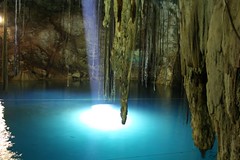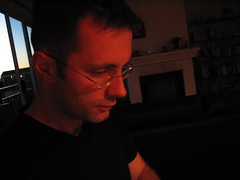
Click on picture to view slideshow
We saw the Mayan ruins at Ek'Balam, and dabbled our feet in the waters of the Cenote Dzitnup. ("cenotes" are small caves, close to the surface, with lakes at their bottom). We took many pictures, but this Internet-cafe is closing soon, so I will update the blog and leave; I have no time foir stories, and we have a few already... more updates soon!
Click on the picture for the slide-show and enjoy!




5 comments:
you know, i was just watching something on tv about those caves. they look fucking awesome.
The pics look great!!!! Fritzy, got a question for you - what's the situation with Starbucks there?
Svet:
Alas, there is no Starbucks in Yucatan (maybe in Cancun, but we only saw the airport). However we found good coffee-shops, so my addiction is provided for...
Steve:
Sadly, I had forgotten to bring swimming trunks with me, and couldn't swim in those waters. Now I bought some. Next time, I won't miss a splash; this area is full of "cenotes"...
wait, you brought 4 long sleeve shirts and no swim trunks?!?!?!?!?!!??!
When we were at Semuc Champey I was wearing hiking gear and wanted to swim, but didn't want to scrape up my feet - so I just dove in. Bad idea; between the current, the extra weight and the fact that I was totally exhausted from hiking, I sank right to the bottom. Katie couldn't figure out why it was taking me so long to resurface.
As for "old rocks": I sort of feel the same way. We always go to ruins almost out of a touristic obligation - and admittedly I enjoy some of them a lot (like Lamanai) but I find contemporary Mayan villages WAY more interesting than the ones that haven't been populated in a few centuries.
Post a Comment